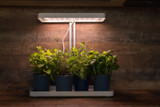The Importance of Choosing the Right Media for Hydroponics
Hydroponics is an innovative way to grow plants without soil, using nutrient-rich water as the base. This system is ideal for those looking to grow plants quickly and efficiently, offering a way to control every aspect of the plant's environment. With hydroponics, you don't have to worry about weeds and soil-borne pests, which often complicate traditional gardening. Instead, you can focus on optimizing water and nutrient delivery to ensure your plants receive exactly what they need to thrive.
One of the most important aspects of hydroponics is selecting the right media. This provides physical support for your plants as they grow. Choosing the right media is crucial for ensuring that your plants have the optimal environment for root growth and nutrient absorption. Different types of media have unique properties that can affect water retention, aeration, and root support. Making the right choice can lead to healthier plants and more abundant yields.
Understanding Different Types of Hydroponic Media
To make informed decisions, you must first understand the different types of hydroponic media available. Each type comes with its own set of characteristics that make it suitable for specific plants or growing conditions.
- Rockwool: This is one of the most popular media, made from spun volcanic rock. It is excellent for moisture retention and root support but requires careful pH management.
- Clay Pellets: Expanded clay pellets, also known as hydroton, are excellent for drainage and aeration. They're reusable and provide good stability for plants, making them a versatile medium.
- Perlite: Often used as a soil amendment, perlite is a lightweight and porous substance that provides excellent drainage and aeration. It's suitable for plants that do not require constant moisture.
- Coconut Coir: Made from coconut husks, this is a sustainable option. It retains moisture well and offers good aeration, making it perfect for keeping roots healthy and preventing overwatering.
Each media type comes with its own pros and cons, suited to different plants and growth stages. As you delve into hydroponics, keep in mind the importance of matching your media to your specific plant needs to achieve the best results. This understanding acts as a foundation for selecting the best possible options, tailoring your approach to match the demands of your hydroponic setup.
Selecting the Right Media for Your Plants
Choosing the right media involves considering several factors that can impact the success of your hydroponic system. Key considerations include the type of plant you're growing, its growth stage, and how much water retention is ideal for your setup. Some plants thrive in media that retains more moisture, while others need excellent drainage to avoid root rot.
To make the best choice, start by examining your plant's specific needs. For example, lush greens like lettuce may do well in a medium that holds moisture, such as coconut coir. On the other hand, herbs like basil may prefer something more aerated, like clay pellets.
Consider these key factors:
- Plant Type: Different plants require varying moisture levels and root support.
- Growth Stage: Seedlings might need different conditions than mature plants.
- Water Retention: Media should balance water retention and drainage to keep roots healthy.
By understanding these elements, you can align your media choice with your plant's unique requirements. This tailored approach boosts growth results and keeps your plants thriving.
Maintaining and Replacing Hydroponic Media
Proper maintenance is critical for the longevity of your hydroponic media. Keeping the media clean ensures your plants continue to receive the right balance of nutrients and air. Over time, media can become compacted or clogged, which can affect water flow and nutrient delivery to your plants.
Here are some tips for maintaining your media:
- Regular Inspection: Check for signs of wear, compaction, or algae growth.
- Gentle Cleaning: Rinse your media with water to remove debris and salts.
- Monitor pH Levels: Keep an eye on the pH levels to maintain a healthy growing environment.
When it's time to replace the media, look for these signs:
- Discoloration or Foul Odor: These can indicate decay or contamination.
- Reduced Plant Performance: If plants aren't growing as expected, old media might be the cause.
Simple maintenance routines extend the life of your media and improve plant health. By following these steps, you'll ensure your hydroponic garden remains vibrant and productive.
Creating a Thriving Hydroponic Garden
Creating a successful hydroponic garden doesn't just end with selecting the right media. It's all about understanding the unique needs of your plants and customizing each element to provide optimal growth conditions. Every plant type may have its preferred media, and experimenting can lead to discovering the best fit for your plants' wellness.
In essence, the right media is a game-changer for your hydroponic setup, maximizing your plant yields and promoting healthier growth. Customizing media choices and maintaining it with diligence allows you to create a nourishing environment where plants can thrive all year round.
By keeping these insights in mind while you cultivate, you'll develop a thriving garden that keeps producing results. This process not only leads to bigger harvests but also allows you to enjoy the satisfaction of growing your own healthy, vibrant plants.
To ensure your plants thrive with optimal support, check out the hydroponic growing media available at Shore Grow. With the right foundation for moisture balance and root strength, you’ll be on track to a stronger and more productive garden year-round.
Recent Posts
-
How to Adjust LED Grow Light Settings for Optimal Growth
LED grow lights have become a favorite tool for many cannabis growers, thanks to their efficiency an …Oct 29th 2025 -
Must-Have Lighting Accessories for Any Grow Room
Starting a cannabis grow room can be quite an adventure, especially when it comes to picking the rig …Oct 29th 2025 -
Tips for Resolving Inefficiencies in High Intensity Discharge Lamps
High Intensity Discharge (HID) lamps play a crucial role in hydroponic cannabis cultivation, offerin …Oct 22nd 2025




